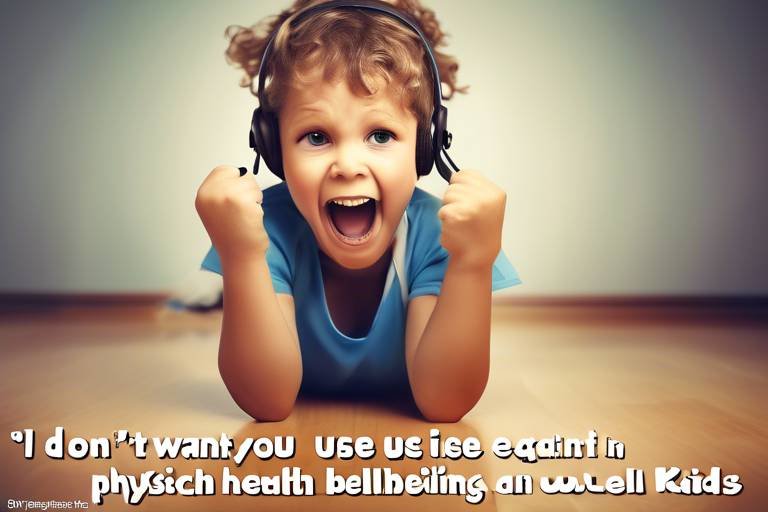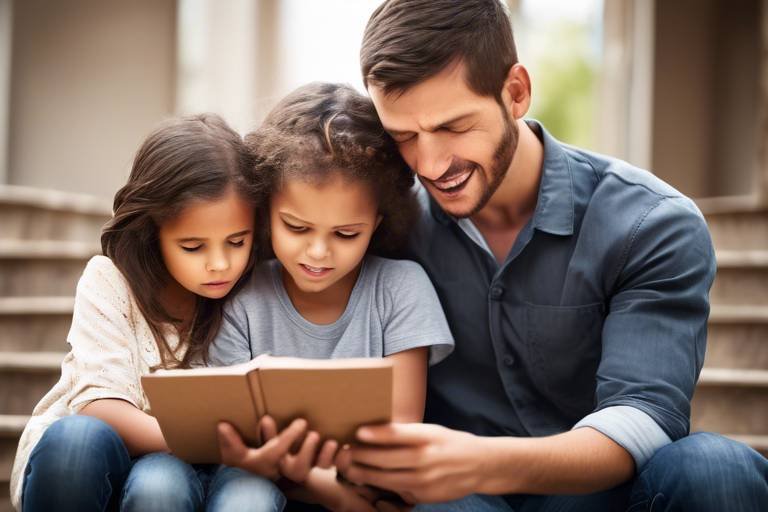Childhood Mental Health: A Guide for Every Parent
As parents, we often find ourselves juggling a million responsibilities, from school runs to work commitments, but one crucial aspect that should never be overlooked is our children's mental health. Childhood mental health is not just a buzzword; it's a vital part of a child's overall development and well-being. Just like physical health, mental health plays a pivotal role in how children think, feel, and interact with the world around them. When we talk about childhood mental health, we’re diving into a complex world where emotions, behaviors, and social interactions intertwine. It's essential to understand that mental health issues can affect children of any age, background, or environment, and recognizing this early can make all the difference.
Imagine a young child who seems withdrawn or anxious; it could be easy to dismiss such behaviors as just a phase. However, these could be early signs of deeper emotional issues that, if left unaddressed, might lead to significant challenges later in life. By understanding the importance of mental health, we empower ourselves to create a nurturing environment where our children can thrive both emotionally and socially. This guide aims to equip you with the knowledge and tools necessary to support your child's mental health journey, ensuring they grow into resilient, happy adults.
Moreover, in this fast-paced world, children are often exposed to various stressors that can impact their mental well-being. From academic pressures to social media influences, the challenges they face can be overwhelming. As parents, it's our responsibility to help them navigate these challenges effectively. By fostering open communication, teaching coping mechanisms, and recognizing when professional help is needed, we can create a solid foundation for our children's emotional health.
In the following sections, we will delve deeper into what childhood mental health encompasses, identify common mental health issues, explore effective strategies for support, and discuss when to seek professional help. So, buckle up, because understanding and supporting your child's mental health is a journey worth taking!
Childhood mental health encompasses a range of emotional, psychological, and social well-being factors. It influences how children think, feel, and behave in their daily lives. Just as we monitor our children's physical health through regular check-ups and vaccinations, we should also pay close attention to their emotional and mental states. A child's mental health is crucial not only for their present happiness but also for their future success and relationships.
Think of mental health as the foundation of a house; if the foundation is weak, the entire structure is at risk. Similarly, if children struggle with their mental health, it can affect their academic performance, social interactions, and even their physical health. That's why understanding the nuances of childhood mental health is so important. It’s not just about preventing mental illness; it’s about fostering resilience, building coping skills, and promoting overall emotional well-being.
Throughout this article, we will explore various aspects of childhood mental health, providing insights and practical tips that you can implement in your daily life. Together, we can create a supportive environment that nurtures our children’s mental health and prepares them for the challenges of life.
It's essential to be aware of the common mental health issues that children may face. These include anxiety, depression, Attention Deficit Hyperactivity Disorder (ADHD), and more. Each of these conditions manifests differently and can have varying impacts on a child's life. Understanding the signs and symptoms of these issues can help parents identify potential concerns early on, allowing for timely intervention and support.
Recognizing anxiety in children can be challenging, as they may not always express their feelings verbally. Instead, they might display a range of physical and behavioral signs that indicate they are struggling. It's crucial for parents to be vigilant and observant, as early recognition can lead to effective support.
Anxiety can manifest physically in children, often leading to symptoms such as:
- Headaches
- Stomachaches
- Fatigue
If your child frequently complains about these symptoms without a clear medical cause, it may be time to consider their emotional state as a contributing factor.
In addition to physical symptoms, children may exhibit various behavioral changes when experiencing anxiety. Watch for signs such as:
- Withdrawal from friends and activities
- Increased irritability or mood swings
- Changes in sleep patterns, such as trouble falling asleep or nightmares
Being aware of these signs can help parents take appropriate action to support their child's mental health.
Attention Deficit Hyperactivity Disorder (ADHD) is a common condition among children that can significantly impact their academic and social lives. Children with ADHD may struggle with maintaining attention, controlling impulses, and managing hyperactivity. Understanding the symptoms and causes of ADHD is essential for parents to provide the right support and interventions.
By recognizing the signs of mental health issues early, parents can take proactive steps to help their children navigate these challenges, ensuring they have the tools they need to thrive.
As parents, our role in nurturing our children's mental health is paramount. Here are some practical strategies to create a supportive environment:
Open dialogue about feelings and emotions is vital for fostering a healthy mental state. Encourage your child to express their thoughts and feelings by creating a safe space for discussion. Ask open-ended questions and listen actively to what they have to say. This can help your child feel valued and understood, which is essential for their emotional well-being.
Teaching children healthy coping strategies can equip them with the tools they need to manage stress and emotions effectively. Techniques such as mindfulness, deep breathing exercises, and problem-solving skills can be incredibly beneficial. By modeling these behaviors and practicing them together, you can help your child develop resilience and emotional intelligence.
Knowing when to seek professional assistance for your child's mental health is crucial. If you notice persistent signs of distress or if your child's behavior significantly changes, it may be time to consult a mental health professional.
Serious mental health issues require immediate professional intervention. Signs that may indicate a need for professional help include:
- Thoughts of self-harm or suicide
- Severe mood swings
- Significant changes in behavior, such as aggression or withdrawal
Recognizing these signs can ensure timely support for your child, making a world of difference in their recovery journey.
Choosing the right mental health professional is crucial for effective treatment. Look for qualified therapists or counselors who specialize in childhood mental health. Don't hesitate to ask questions about their experience and approach to ensure they are the right fit for your child.
Q: How can I tell if my child needs help with their mental health?
A: Look for persistent signs of distress, changes in behavior, or significant mood swings. If you have concerns, it’s best to consult a mental health professional.
Q: What are some signs of anxiety in children?
A: Common signs include physical symptoms like headaches or stomachaches, withdrawal from activities, irritability, and changes in sleep patterns.
Q: How can I support my child's mental health at home?
A: Encourage open communication, teach healthy coping strategies, and create a supportive environment where your child feels safe expressing their feelings.

Understanding Childhood Mental Health
Childhood mental health is a vital aspect of a child's overall development, encompassing emotional, psychological, and social well-being. Just like physical health, mental health plays an essential role in how children think, feel, and interact with others. It's important for parents to understand that a child's mental health can significantly impact their learning, behavior, and relationships. In fact, the early years of life are incredibly formative, and nurturing a child's mental health during this time can lay the groundwork for a healthier future.
Imagine a child's mind as a garden. If nurtured with care, it can bloom beautifully, but if neglected, it may wither. Childhood mental health is about ensuring that this garden is tended to, allowing children to grow emotionally resilient and capable of facing life's challenges. It encompasses various aspects, including the ability to manage emotions, build relationships, and cope with stress. When children are mentally healthy, they are more likely to thrive in school, develop positive friendships, and enjoy a fulfilling life.
Moreover, mental health issues can arise at any age, and they often manifest in different ways. Some children may express their struggles openly, while others might internalize their feelings, making it crucial for parents to be observant. Factors such as genetics, environment, and life experiences can all influence a child's mental health. For instance, a supportive home environment can foster resilience, while exposure to trauma or stress can lead to mental health challenges. Parents must recognize that they are the first line of defense in identifying and addressing these issues.
To help parents better understand the importance of childhood mental health, here are some key points to consider:
- Emotional Development: Children need to learn how to express and manage their emotions effectively. This includes understanding feelings like happiness, sadness, anger, and fear.
- Social Skills: Healthy mental development allows children to build strong relationships with peers and adults, which is crucial for their social integration.
- Coping Mechanisms: Teaching children how to cope with stress and adversity is essential. This equips them with the tools they need to face challenges throughout life.
In conclusion, understanding childhood mental health is not just about recognizing problems; it's about fostering an environment where children feel safe to express themselves and seek help when needed. By being proactive and attentive, parents can significantly contribute to their child's mental well-being, ensuring they grow into emotionally healthy adults.

Common Mental Health Issues in Children
When it comes to childhood mental health, it's essential to understand that children can face a variety of challenges that can significantly affect their emotional and psychological well-being. Just like adults, children can experience mental health issues, and recognizing these problems early can make all the difference in their development and happiness. Some of the most common mental health issues that children might encounter include anxiety, depression, and Attention Deficit Hyperactivity Disorder (ADHD). Each of these conditions presents unique signs and symptoms, which can sometimes be subtle, making it crucial for parents to be vigilant.
For instance, anxiety is a prevalent issue among children, often arising from various stressors such as school pressures, family dynamics, or social interactions. Children may not always articulate their feelings, so parents must be attentive to changes in behavior or mood. Similarly, depression can manifest in children as persistent sadness, loss of interest in activities they once enjoyed, or changes in appetite and sleep patterns. It's important to note that while some level of mood fluctuation is normal, prolonged symptoms warrant concern.
ADHD, on the other hand, is characterized by symptoms such as inattention, hyperactivity, and impulsiveness. Children with ADHD might struggle to focus on tasks, follow instructions, or control their impulses, which can lead to challenges in academic settings and social interactions. Understanding these common mental health issues is the first step in supporting children effectively.
Here’s a brief overview of these common mental health issues:
| Mental Health Issue | Common Symptoms |
|---|---|
| Anxiety |
|
| Depression |
|
| ADHD |
|
Understanding these mental health issues is not just about recognizing symptoms; it’s about fostering an environment where children feel safe to express their feelings. By being proactive and informed, parents can help their children navigate these challenges more effectively. After all, a child’s emotional health is just as important as their physical health, and addressing these issues early can lead to healthier, happier futures.

Signs of Anxiety in Children
This article explores the critical aspects of childhood mental health, providing insights and practical tips for parents to support their children's emotional well-being and development.
Childhood mental health encompasses a child's emotional, psychological, and social well-being. It is crucial because it affects how children think, feel, and act as they grow. Good mental health is essential for a child's overall growth, influencing their ability to learn, interact with others, and handle stress. When children face mental health challenges, it can impact their academic performance, relationships, and even physical health. Therefore, understanding and nurturing their mental well-being is a responsibility that every parent should take seriously.
Many children may face mental health issues such as anxiety, depression, and Attention Deficit Hyperactivity Disorder (ADHD). Recognizing these issues early can make a significant difference. For instance, anxiety is not just about worrying; it can manifest in various ways that may go unnoticed. Similarly, symptoms of depression can often be mistaken for typical childhood mood swings. ADHD affects a child's ability to focus and can hinder their academic and social life. By being aware of these common issues, parents can take proactive steps to support their children.
Recognizing anxiety in children can be challenging because they often lack the vocabulary to express their feelings. However, being vigilant about certain signs can help parents identify whether their child is struggling with anxiety. Common indicators include excessive worrying about everyday activities, fear of separation from parents, and a noticeable decline in school performance. Children may also express their anxiety through physical symptoms, such as headaches or stomachaches, which can often lead to visits to the doctor without addressing the emotional root cause.
Behavioral changes are another crucial area to observe. For example, a previously outgoing child may suddenly become withdrawn, avoiding social interactions or activities they once enjoyed. Irritability and mood swings can also signal anxiety, as can changes in sleep patterns, such as difficulty falling asleep or frequent nightmares. By paying attention to these signs, parents can better understand their child's emotional state and take appropriate action.
Anxiety can manifest physically in children, making it essential for parents to recognize these symptoms. Children might complain of:
- Headaches: Frequent headaches that seem to have no medical explanation.
- Stomachaches: Complaints of tummy troubles, especially before school or social events.
- Fatigue: Unexplained tiredness, which may stem from poor sleep quality due to anxiety.
These physical symptoms can often mislead parents, leading them to believe there is a purely physical issue at play. However, understanding that these complaints may be linked to emotional distress is crucial for addressing the underlying anxiety.
Children may exhibit various behavioral changes when experiencing anxiety. Some behaviors parents should watch for include:
- Withdrawal: A child who once enjoyed playdates may suddenly refuse to engage with friends.
- Irritability: Increased irritability or anger over minor issues can be a sign of underlying anxiety.
- Changes in sleep patterns: Difficulty falling asleep, frequent nightmares, or waking up in the night.
By being observant and open to discussing these behaviors, parents can create a safe space for their children to express their feelings and seek help when necessary.
Attention Deficit Hyperactivity Disorder (ADHD) is a common condition among children. This section explains its symptoms, causes, and how it can affect a child's academic and social life.
Parents play a crucial role in nurturing their child's mental health. This section provides practical strategies for creating a supportive environment, fostering open communication, and encouraging emotional expression.
Open dialogue about feelings and emotions is vital. This part discusses techniques for parents to facilitate conversations with their children about mental health and emotional challenges.
Teaching children healthy coping strategies is essential for managing stress and emotions. This subsection outlines various techniques, such as mindfulness and problem-solving skills, that can benefit children.
It's important for parents to know when to seek professional assistance for their child's mental health. This section outlines indicators that suggest a child may need further evaluation or therapy.
This segment helps parents identify serious mental health issues that require immediate professional intervention, ensuring timely support for their child.
Choosing the right mental health professional is crucial. This part offers guidance on how parents can find qualified therapists or counselors who specialize in childhood mental health.
Q: How can I tell if my child is experiencing anxiety?
A: Look for signs such as excessive worry, physical complaints like stomachaches, and behavioral changes like withdrawal or irritability.
Q: What should I do if I notice these signs?
A: Start by having an open conversation with your child about their feelings. If the anxiety persists, consider seeking help from a mental health professional.
Q: Are there any effective coping strategies I can teach my child?
A: Yes! Techniques like mindfulness, deep breathing exercises, and problem-solving skills can be very helpful for managing anxiety.

Physical Symptoms of Anxiety
When it comes to children, anxiety can often be a silent struggle, manifesting in ways that are not immediately obvious. It's like a storm brewing inside them, while on the outside, everything seems fine. Parents may notice their child becoming increasingly withdrawn or irritable, but the underlying cause could be anxiety. One of the most concerning aspects of anxiety in children is that it can manifest through various physical symptoms, making it crucial for parents to be vigilant and observant.
Children may complain of headaches, which can often be dismissed as just another childhood ailment. However, if these headaches become frequent and are accompanied by other symptoms, they may be indicative of anxiety. Similarly, stomachaches are common complaints among anxious children, often resulting from the body's stress response. The gut is closely linked to our emotions; thus, when a child is feeling anxious, their stomach might react in kind. Fatigue is another physical symptom that can arise from anxiety. A child who is constantly on edge may find it exhausting to keep up with daily activities, leading to feelings of tiredness and lethargy.
Moreover, anxiety can also lead to changes in appetite. Some children may eat less than usual, while others may turn to comfort foods as a way to cope with their feelings. This can lead to noticeable fluctuations in weight, which should not be overlooked. In some cases, anxiety can even lead to sleep disturbances, such as insomnia or nightmares. A child who is unable to relax and unwind may find it difficult to fall asleep or stay asleep, resulting in a cycle of fatigue and heightened anxiety.
Here’s a quick overview of some common physical symptoms of anxiety in children:
- Headaches
- Stomachaches
- Fatigue
- Changes in appetite
- Sleep disturbances
As a parent, if you notice your child exhibiting these physical symptoms, it's essential to have an open conversation with them about what they might be feeling. Sometimes, just knowing that they can talk about their worries can alleviate some of the physical manifestations of anxiety. Remember, understanding is the first step toward helping them navigate their emotions.

Behavioral Signs of Anxiety
When it comes to recognizing anxiety in children, parents often find it challenging. Unlike adults, children may not have the vocabulary or understanding to express their feelings clearly. Instead, they might exhibit behavioral signs that suggest they are struggling internally. It's essential for parents to be vigilant and observant, as these signs can sometimes be subtle yet significant indicators of anxiety.
One of the most common behavioral changes is withdrawal. A child who once enjoyed playing with friends or participating in family activities may suddenly prefer to isolate themselves. This withdrawal can manifest as a reluctance to engage in social situations or a marked decrease in enthusiasm for previously loved activities. Alongside withdrawal, you might notice increased irritability. Children experiencing anxiety may become easily frustrated or upset over minor issues, which can be perplexing for parents who are used to their child being more easygoing.
Another critical sign to watch for is changes in sleep patterns. Anxiety can lead to difficulties in falling asleep or staying asleep, resulting in a child who appears tired or cranky during the day. Sometimes, children may express their anxiety through physical complaints, like frequent stomachaches or headaches, which can often be dismissed as typical childhood ailments. However, if these symptoms persist without a clear physical cause, they may be a cry for help.
Additionally, children may exhibit changes in academic performance. If a child who previously excelled in school begins to struggle with assignments or shows a lack of interest in their studies, this could indicate underlying anxiety. In some cases, you might notice an increase in avoidance behaviors, where the child actively avoids situations that trigger their anxiety, such as school presentations or social gatherings.
It's essential to foster an environment where children feel safe expressing their feelings. Parents can encourage open dialogue by asking simple questions about their child's day or feelings. This approach not only helps in identifying anxiety but also builds trust and strengthens the parent-child relationship. Remember, recognizing these behavioral signs early can be crucial in providing the support and interventions necessary for your child's emotional well-being.
- What are common signs of anxiety in children?
Common signs include withdrawal from social activities, irritability, changes in sleep patterns, and physical complaints like stomachaches or headaches.
- How can I help my child if I suspect they have anxiety?
Encourage open communication, listen to their concerns, and consider seeking guidance from a mental health professional if the signs persist.
- When should I seek professional help for my child's anxiety?
If your child's anxiety interferes with their daily life, academic performance, or relationships, it may be time to consult a therapist or counselor.

Understanding ADHD
Attention Deficit Hyperactivity Disorder, commonly known as ADHD, is a neurodevelopmental disorder that affects millions of children worldwide. It’s not just about being hyperactive; ADHD encompasses a range of symptoms that can significantly impact a child's daily life, including their academic performance and social interactions. Understanding ADHD is crucial for parents, as it allows them to provide the necessary support and interventions for their children.
ADHD is typically characterized by three main types of symptoms: inattention, hyperactivity, and impulsivity. These symptoms can manifest differently in each child, making it essential for parents to be observant. For instance, a child with ADHD may struggle to pay attention in class, find it challenging to follow instructions, or frequently lose items necessary for tasks and activities. This inattention can often lead to frustration and a sense of failure, both for the child and their parents.
On the other hand, hyperactivity is often the most visible symptom of ADHD. Children may seem to be in constant motion, unable to sit still, or may talk excessively. This behavior can be particularly challenging in structured environments like schools, where sitting quietly is often expected. Impulsivity, another key component of ADHD, can lead to hasty actions without considering the consequences, such as interrupting others or making rash decisions.
It's important to note that ADHD is not a result of poor parenting or lack of discipline. Instead, it arises from a complex interplay of genetic, environmental, and neurological factors. Studies have shown that children with ADHD often have differences in brain structure and function, particularly in areas responsible for attention and impulse control. Understanding this can help parents approach their child's behavior with empathy rather than frustration.
To further illustrate the impact of ADHD, consider the following table that outlines the common symptoms associated with the disorder:
| Symptom Type | Common Symptoms |
|---|---|
| Inattention |
|
| Hyperactivity |
|
| Impulsivity |
|
Parents may notice that their child’s symptoms can vary in intensity and impact over time. Some children may exhibit more pronounced symptoms at certain ages or in specific environments, such as school versus home. This variability can sometimes lead to confusion or misdiagnosis, making it even more important for parents to seek guidance from qualified professionals if they suspect their child may have ADHD.
In conclusion, understanding ADHD is the first step in fostering a supportive environment for children affected by this disorder. By recognizing the symptoms and acknowledging the underlying causes, parents can better advocate for their children’s needs, ensuring they receive the appropriate interventions and support, both at home and in educational settings. Remember, knowledge is power, and being informed about ADHD can lead to a more compassionate and effective approach to parenting.

Strategies for Supporting Mental Health
As parents, we hold the key to our children's emotional well-being. It's not just about meeting their physical needs; it's about nurturing their mental health too. Think of it as gardening—just as plants need the right conditions to thrive, children need a supportive environment to grow emotionally. So, how can we create that environment? Here are some practical strategies that can make a world of difference.
First and foremost, open communication is essential. Imagine trying to build a bridge without knowing what lies on the other side. If your child feels comfortable sharing their thoughts and feelings with you, it lays the foundation for trust. To encourage this, set aside time each day for casual conversations. Ask about their day, their friends, or even what they think about a recent movie. This not only strengthens your bond but also gives them a safe space to express their emotions.
Another effective strategy is to promote healthy coping mechanisms. Life can be overwhelming, and children often need guidance on how to handle stress. Teach them techniques such as mindfulness and deep breathing exercises. You could even practice these techniques together, turning it into a fun activity. For example, you might say, "Let's take a moment to breathe deeply and count to five together." This not only helps them manage anxiety but also fosters a sense of teamwork between you and your child.
Additionally, creating a routine can be incredibly beneficial. Children thrive on structure, and a predictable schedule can provide a sense of security. Incorporate time for homework, play, and relaxation into their daily routine. This way, they know what to expect, which can alleviate anxiety. You might even consider using a visual schedule, where they can see their day laid out in front of them, making it easier for them to understand what comes next.
Moreover, it's crucial to encourage emotional expression. Children often find it hard to articulate their feelings. You can help by giving them the vocabulary to express themselves. Try asking questions like, "How did that make you feel?" or "What do you think about that situation?" You might also introduce them to creative outlets such as drawing or journaling, where they can express their feelings without the pressure of words. This can be a powerful way for them to process their emotions.
Lastly, don't underestimate the power of self-care. Just as you take time for your own mental health, encourage your children to do the same. This could be as simple as taking a quiet moment to read a book or engaging in a favorite hobby. Encourage them to recognize when they need a break and to take it without guilt. Remember, modeling self-care behaviors yourself can inspire them to prioritize their well-being too.
By implementing these strategies, you’re not just supporting your child's mental health; you're equipping them with essential life skills. It's like giving them a toolbox filled with everything they need to navigate through life's challenges. And the best part? You're in this together, making it a journey of growth for both of you!
- How can I tell if my child is struggling with their mental health? Look for changes in behavior, mood swings, or withdrawal from activities they once enjoyed.
- What should I do if my child refuses to talk about their feelings? Try to create a safe space for them and consider engaging in activities they enjoy to open up communication.
- When should I seek professional help for my child? If you notice persistent changes in behavior or emotional distress that lasts for weeks, it may be time to consult a mental health professional.

Encouraging Open Communication
When it comes to nurturing a child's mental health, one of the most powerful tools in a parent's arsenal is open communication. Imagine your child’s mind as a garden; if you want it to flourish, you must regularly tend to it. This means creating a safe space where your child feels comfortable expressing their thoughts and emotions without fear of judgment. But how exactly can you cultivate this environment?
First and foremost, it’s essential to lead by example. Children often mimic the behavior of adults, so show them how to express feelings by sharing your own. For instance, if you had a tough day at work, talk about it. Say something like, “I felt really stressed today because of a big project, but I took a few deep breaths to calm down.” This not only normalizes the conversation about emotions but also teaches them healthy coping mechanisms.
Moreover, timing is everything. Choose moments when your child is relaxed and open, perhaps during a quiet evening at home or while engaging in a fun activity. This can make it easier for them to share their thoughts. You might say, “I noticed you've been a bit quieter lately. Want to talk about what's on your mind?” Such prompts can gently encourage them to open up.
Another effective strategy is to ask open-ended questions. Instead of yes-or-no questions, try asking, “What made you feel happy today?” or “Can you tell me about something that upset you recently?” These types of questions require more thought and can lead to deeper discussions, enabling your child to articulate their feelings better.
Additionally, be an active listener. This means not just hearing their words but also paying attention to their body language and emotions. Show empathy and validate their feelings. You might say, “It’s completely okay to feel that way. I’m here for you.” This reassurance can make a world of difference in how your child perceives their emotions and your support.
Furthermore, consider establishing a routine for these conversations. Perhaps you could have a “feelings check-in” at dinner each night where everyone shares something about their day. This not only fosters a sense of community but also normalizes discussions about emotions as a family practice.
Lastly, don't forget to celebrate their openness! When your child shares something personal, acknowledge it positively. A simple “I’m really proud of you for sharing that” can encourage them to continue being open in the future. Remember, building a foundation of trust takes time, but with patience and consistency, you can create a nurturing environment where your child feels comfortable discussing their mental health.
In conclusion, encouraging open communication is not just a one-time effort; it's an ongoing process. By practicing these strategies, you can help your child feel valued and understood, paving the way for a healthier emotional landscape. After all, a child who can express their feelings is better equipped to navigate the ups and downs of life.
- Why is open communication important for children's mental health?
Open communication allows children to express their feelings, reducing anxiety and promoting emotional well-being. - How can I encourage my child to talk about their feelings?
Use open-ended questions, share your own feelings, and create a safe, judgment-free space for discussions. - What should I do if my child is reluctant to share their feelings?
Be patient, offer support, and try different approaches like engaging in activities together to make them feel more comfortable.

Promoting Healthy Coping Mechanisms
As parents, one of the most impactful gifts we can give our children is the ability to cope with life's challenges in a healthy way. Just like we teach them to ride a bike or tie their shoes, we must also guide them in developing coping mechanisms that can help them navigate their emotions and stressors. But what exactly does this entail? Well, let's break it down!
First and foremost, it's essential to create an environment where children feel safe expressing their feelings. Encourage them to talk about their emotions openly. You might say, "It's okay to feel upset or anxious; let's talk about it." This simple reassurance can make a world of difference. When children know they have a supportive ear, they are more likely to share their thoughts and feelings, which is the first step in developing healthy coping strategies.
One effective way to promote healthy coping mechanisms is through mindfulness practices. Mindfulness teaches children to focus on the present moment, helping them manage overwhelming feelings. You could introduce them to simple breathing exercises: for instance, inhaling deeply through the nose for a count of four, holding for four, and exhaling slowly through the mouth for another four counts. This technique not only calms the mind but also reduces physical symptoms of anxiety.
Another strategy is to encourage creative expression. Art, music, and writing can serve as excellent outlets for children to process their emotions. You might set up a dedicated space for art supplies or provide them with a journal where they can freely express themselves. You could even engage in these activities together, making it a bonding experience that fosters open communication.
Additionally, teaching problem-solving skills can empower children to tackle challenges head-on. When they face a problem, guide them through a step-by-step process of identifying the issue, brainstorming solutions, and evaluating the outcomes. This not only boosts their confidence but also equips them with the tools to handle future obstacles independently.
Lastly, it's important to model healthy coping mechanisms yourself. Children often learn by observing their parents. If they see you managing stress through exercise, hobbies, or talking about your feelings, they are likely to adopt similar behaviors. Remember, you are their role model, and your actions speak volumes!
In summary, promoting healthy coping mechanisms in children involves a combination of open communication, mindfulness practices, creative outlets, problem-solving skills, and leading by example. By nurturing these skills, we can help our children grow into resilient individuals who can face life's challenges with confidence and grace.
- What are some signs that my child may need help with coping? Look for changes in behavior, such as increased irritability, withdrawal from activities, or changes in sleeping and eating patterns.
- How can I encourage my child to talk about their feelings? Create a safe space for discussions, ask open-ended questions, and validate their feelings without judgment.
- When should I seek professional help for my child's mental health? If you notice persistent signs of distress or if their coping mechanisms are not improving over time, it may be time to consult a mental health professional.

When to Seek Professional Help
As parents, it’s natural to want to shield your children from any form of distress. However, there are times when the challenges they face may be beyond what you can manage alone. Knowing when to seek professional help for your child's mental health is crucial. It’s like navigating a ship through a storm; sometimes, you need the expertise of a seasoned captain to guide you safely to shore. But how do you know when it’s time to call for help?
One of the first indicators that your child might need professional support is if you notice persistent changes in their behavior or mood. For instance, if your normally cheerful child suddenly becomes withdrawn or irritable for an extended period, it could be a sign that something deeper is troubling them. Think of it as a warning light on your car's dashboard; ignoring it could lead to bigger problems down the road.
Additionally, if your child expresses feelings of hopelessness or worthlessness, or if they talk about wanting to escape their problems, these are serious red flags. It’s important to take such comments seriously, as they may indicate that your child is struggling with their mental health. This doesn’t mean you should panic, but rather that you should take proactive steps to understand what they’re going through.
Here are some other signs that may suggest the need for professional assistance:
- Decline in Academic Performance: If your child’s grades drop significantly or they lose interest in school, it might be time to investigate further.
- Changes in Sleeping or Eating Habits: Sudden changes in appetite or sleep patterns can indicate emotional distress.
- Social Withdrawal: If your child starts isolating themselves from friends and family, it’s a cause for concern.
- Substance Abuse: Experimentation with drugs or alcohol can be a cry for help and should be addressed immediately.
Recognizing these signs early can make a significant difference in your child’s mental health journey. If you observe any of these symptoms, it’s essential to consult with a mental health professional. They can provide a thorough evaluation and help determine the best course of action. Remember, seeking help is not a sign of failure; it’s a brave step towards ensuring your child receives the support they need.
Finding the right mental health professional can feel daunting, but it doesn’t have to be. Start by looking for therapists or counselors who specialize in childhood mental health. You can ask for recommendations from your child’s pediatrician, school counselor, or even trusted friends. Additionally, many online directories can help you find qualified professionals in your area. It’s vital to choose someone who makes your child feel comfortable and understood, as this can significantly impact the effectiveness of the therapy.
In conclusion, being proactive about your child's mental health can lead to healthier emotional development and resilience. Just like you would seek a doctor for a physical ailment, don’t hesitate to reach out for help when it comes to mental health issues. Your child’s well-being is worth it.
Q: How do I know if my child needs therapy?
A: Look for persistent changes in mood, behavior, or academic performance. If your child shows signs of distress that last for weeks or months, it’s time to consult a mental health professional.
Q: What should I expect during my child's first therapy session?
A: The first session typically involves an assessment where the therapist will ask questions about your child's feelings, behaviors, and family dynamics to understand their situation better.
Q: How can I support my child during therapy?
A: Encourage open communication about their feelings and experiences. Let them know it’s okay to express themselves and that seeking help is a sign of strength.
Q: Is therapy effective for children?
A: Yes, therapy can be very effective for children. It provides them with tools to manage their emotions, cope with stress, and develop healthier relationships.

Identifying Serious Concerns
As parents, it’s natural to be concerned about our children’s well-being, especially when it comes to their mental health. But how do you know when a child's behavior is just a phase or something more serious? Identifying serious mental health concerns in children can be tricky, but understanding the signs is crucial. Think of it like being a detective in your own home, piecing together clues to ensure your child is happy and healthy.
One of the first things to look out for is a significant change in your child's behavior. If your normally cheerful child suddenly becomes withdrawn or irritable, it could be a red flag. It's essential to consider the duration and intensity of these changes. For example, if your child has been showing signs of distress for more than a couple of weeks, it’s time to take action. Trust your instincts—if something feels off, it probably is.
Another aspect to consider is how these behavioral changes affect their daily life. Are they struggling in school, losing interest in activities they once loved, or having difficulty maintaining friendships? These issues can indicate that their mental health is being compromised. To help you identify serious concerns, here are some specific signs to watch for:
- Persistent Sadness: If your child seems sad or hopeless most of the time, this could be a sign of depression.
- Extreme Mood Swings: Frequent and intense mood changes that disrupt daily life may indicate a mood disorder.
- Changes in Eating or Sleeping Patterns: Noticeable weight loss or gain, or significant changes in sleep habits can signal distress.
- Decline in Academic Performance: A sudden drop in grades or lack of interest in school can be a cause for concern.
- Withdrawal from Social Activities: If your child is avoiding friends or family, this isolation may point to underlying issues.
It’s also important to consider any physical symptoms that may accompany emotional distress. Children often express their feelings through physical complaints, such as stomachaches or headaches, which can be their way of communicating that something is wrong. If these symptoms persist without a clear medical cause, it’s crucial to investigate further.
Lastly, if your child talks about self-harm or expresses thoughts of wanting to harm themselves or others, take this seriously and seek professional help immediately. These are critical indicators that require urgent attention. Remember, as a parent, you are your child’s first line of defense. By being observant and proactive, you can help ensure they receive the support they need.
In conclusion, identifying serious mental health concerns in children is about being attentive to changes in behavior, emotional expression, and physical health. If you notice any of these signs, don't hesitate to reach out for help. The sooner you act, the better the chances of your child getting the support they need to thrive.
Q: What should I do if I suspect my child has a mental health issue?
A: Start by having a conversation with your child about their feelings. If the concerns persist, consider consulting a mental health professional for an evaluation.
Q: How can I support my child with mental health challenges?
A: Encourage open communication, listen without judgment, and validate their feelings. Additionally, promoting healthy coping mechanisms can greatly help.
Q: When should I seek professional help for my child?
A: Seek help if your child shows persistent signs of distress, such as extreme mood changes, withdrawal, or any thoughts of self-harm.
Q: Are there resources available for parents seeking help?
A: Yes, many organizations provide resources, hotlines, and support groups for parents and children facing mental health challenges. Don’t hesitate to reach out!

Finding the Right Mental Health Professional
Choosing the right mental health professional for your child can feel like searching for a needle in a haystack. With so many options available, it’s essential to approach this task with care and consideration. First and foremost, you want to ensure that the professional you select has experience working specifically with children. Not all therapists are created equal, and finding someone who understands the unique challenges children face is crucial.
When beginning your search, consider starting with a few key steps. Ask for recommendations from your child’s pediatrician, teachers, or trusted friends and family. These referrals can often lead you to professionals who have a proven track record of helping children navigate their mental health challenges. Additionally, you can explore online directories that specialize in mental health professionals. Websites like Psychology Today allow you to filter by location, specialization, and insurance accepted, making it easier to find a suitable match.
Once you have a list of potential professionals, don’t hesitate to reach out. Schedule initial consultations to gauge their approach and compatibility with your child. During these meetings, pay attention to how the therapist interacts with your child. Are they engaging? Do they create a safe and welcoming environment? These factors are vital because a strong therapeutic relationship can significantly impact your child's progress.
Another important consideration is the therapist's qualifications and treatment methods. Look for credentials such as a Licensed Professional Counselor (LPC), Licensed Clinical Social Worker (LCSW), or psychologist. It’s also beneficial to inquire about their preferred treatment approaches. Some professionals may utilize cognitive-behavioral therapy (CBT), while others might focus on play therapy, which can be particularly effective for younger children. Understanding these methods can help you align your child's needs with the therapist's expertise.
Lastly, consider logistics such as location, availability, and cost. It’s essential to find someone whose office is conveniently located, as this can make attending sessions easier for both you and your child. Additionally, check if they accept your insurance or offer sliding scale fees, which can ease the financial burden. Remember, the goal is to find a professional who not only meets your child's needs but also fits well within your family’s lifestyle.
In summary, finding the right mental health professional for your child involves thoughtful consideration, research, and open communication. By taking the time to explore your options and ask the right questions, you can help ensure that your child receives the support they need to thrive emotionally and mentally.
- How do I know if my child needs to see a mental health professional? If your child exhibits persistent signs of distress, such as changes in behavior, mood swings, or difficulty in school, it may be time to seek help.
- What qualifications should I look for in a therapist? Look for licensed professionals with experience in child psychology and specific training in childhood mental health issues.
- How can I prepare my child for their first therapy session? Talk to your child about what to expect, emphasizing that it's a safe space to express their feelings and thoughts.
- What if my child doesn’t connect with the first therapist? It’s perfectly normal for a child to need to try a few different therapists before finding the right fit. Encourage them to be open about their feelings.
Frequently Asked Questions
- What is childhood mental health?
Childhood mental health refers to the emotional, psychological, and social well-being of children. It influences how they think, feel, and behave, affecting their ability to cope with stress, relate to others, and make choices. Just like physical health, mental health is crucial for a child's overall development and happiness.
- What are some common signs of mental health issues in children?
Common signs of mental health issues in children include persistent sadness, excessive worry, changes in behavior, withdrawal from friends and activities, and changes in sleep or appetite. If a child exhibits these signs consistently, it may indicate the need for further evaluation.
- How can I support my child's mental health?
Supporting your child's mental health involves fostering open communication, providing a safe environment for emotional expression, and teaching healthy coping mechanisms. Engage in conversations about feelings, encourage problem-solving skills, and be attentive to their emotional needs.
- When should I seek professional help for my child?
If you notice significant changes in your child's behavior, persistent sadness, or signs of anxiety or distress that interfere with daily life, it may be time to seek professional help. Early intervention can make a significant difference in a child's mental health journey.
- What types of professionals can help with childhood mental health issues?
Mental health professionals who specialize in childhood issues include child psychologists, psychiatrists, and licensed counselors. It's important to find someone experienced in working with children to ensure they receive the best possible care and support.
- How can I identify if my child is experiencing anxiety?
Look for signs such as excessive worry, physical symptoms like stomachaches or headaches, changes in sleep patterns, and behavioral changes like irritability or withdrawal. These can be indicators that your child is struggling with anxiety and may need support.
- What are some healthy coping strategies I can teach my child?
Healthy coping strategies include mindfulness practices, deep breathing exercises, journaling, and engaging in physical activities. Teaching your child these techniques can help them manage stress and express their emotions in a constructive way.
- How can I encourage my child to talk about their feelings?
Encourage open dialogue by creating a safe space for conversation. Ask open-ended questions, listen actively, and validate their feelings. Sharing your own feelings can also help them feel comfortable discussing their emotions.



















